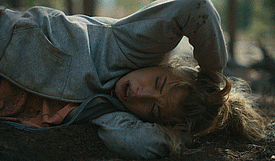About the Time Her House Burned Down

We spoke with the ‘Frank and Lola’ star about the fiery incident and being taken seriously by Philip Seymour Hoffman.
Imogen Poots and I keep circling back to the topic of being taken seriously. The 27-year-old, British-born actor starred in last year’s lauded horror film Green Room as Amber, a Nazi skinhead who fights alongside a traveling punk band to escape from a remote Nazi punk club located deep in the Oregon woods. Poots was nearly overlooked for the role because, as she tells it, director Jeremy Saulnier had seen a picture of her dressed up “in some dumb dress with some dumb hairdo and had been like, ‘What the fuck?’ It was a picture of me at a premiere or something,” she tells me by phone from her home in New York City. “And Jeremy had been like, ‘Nah, whatever.'”
It’s hard to blame someone for not immediately seeing the gorgeous actor as the natural choice to play a skinhead, but those who would attempt to pigeonhole Poots as belonging only in certain kinds of roles are bound for disappointment. Poots’s list of films reads like she’s playing a game of genre-film bingo. She’s done horror before (28 Weeks Later, Fright Night), in addition to comic-book adaptations (V for Vendetta), indie charmers (Greetings from Tim Buckley), big-budget action films (Need for Speed), and romantic comedies (That Awkward Moment). The one constant is the graceful maturity she is capable of bringing to every role, a quality on full display in her role as Lola in writer-director Matthew Ross’s Frank & Lola, in theaters December 9. The film, which co-stars Michael Shannon as Frank, is a psychosexual noir centered on a couple in the midst of a passionate love affair who both make mistakes that destroy their trust in each other.
As the film begins, I experience a flicker of concern that what I’m about to see is something I’ve seen before—a film ostensibly about a relationship, that ends up actually being about a man in love with a caricature of a woman, always beautiful, always bathed in soft, twinkling lights, her nature revealed only through the penetrating gaze of her male counterpart. But I should have put more trust in Imogen Poots: a woman committed to being more than just a pretty face, an actor who demands to be taken seriously.
VICE: It is often the case that the TV and film industry would take a beautiful woman such as yourself and put her in roles where she only functioned as a plot device that sets a male-centered story in motion. But several of your roles, especially Amber in Green Room, successfully avoid that trap. Is it something you are consciously fighting against?
Imogen Poots: It is 100 percent a conscious decision to navigate this industry in a way where I’m not just playing characters subjugated by the male or where I’m an accessory for the male story. It’s really a small percentage of actors who are even able to have this conversation, which is why it is important. But it’s also important not to add to a feeling of embarrassment for people who play certain roles that might be thought of as anti-feminist, because everyone has to start somewhere. I think you have to be able to go to sleep at night and feel OK about decisions you’re making in your life. You have to be very, very disciplined about that and fight for change.
How do you feel like Lola transcends the ingénue role?
People have referred to her as a femme fatale and she’s not. That, again, is an idea of a woman as manipulator or as an unsurpassable sexualized being, demonic in some way. But what I was really drawn to was that you watch two people kinda just fuck up, you know? They make a mistake. And you see these people in a very ugly light at times, which is a real relief, because it’s not that cliché of the girl was perfect and the guy was imperfect and he lost this idea of a woman. No, these people—and this can happen with love, any kind of love, romantic or parental—they lost their minds a little bit. [The film] really becomes about how two human beings react when trust in their relationship is totally diminished. We see these two, naked, flayed souls wondering what the hell to make of it. And it is kind of like rubble, what you’re left with these two.
There seemed to be a central anxiety operating at the core of the film—that anxiety being the paralyzing and permanent mystery of the mind of another person. No matter how connected or in love you are to another person, there is always an unknowable mind that you are contending with.
Yes! And all you are guaranteed is experience from anything [you do], and yet your experience is entirely different from theirs. You’ll come away from an experience thinking one thing, they’ll think another, and you can’t ever fuse those two together. And of course, the more you lose trust in someone, the more you lose respect for them, and then you start to question was it ever them or the idea of them. All of that is very dramatic, for sure. But the point is, too, that there is great nobility because you are watching two people try their best to figure it out.
The experience of watching the film—even from the safety of my home—was emotionally challenging, in part because the direction allows the camera to stay on your face and Michael Shannon’s as you’re having such hard conversations. How did you prepare for such emotionally challenging scenes? Was it a different process than preparing for the equally but differently intense role of Amber in Green Room?
I think the beauty of [Lola] is that she’s really a human being—in that sense that humans are a mixed fucking bag. I am a human being, too, so that equips me with insight into how these characters might or might not prevail. I didn’t realize while making it, but in watching the film, you do sort of feel like a voyeur, but at the same time, you don’t want to look away. It was intense. It is the chaos of human existence on the screen. One of my favorite books is Steppenwolf by Hermann Hesse, and from that I love the idea that man is a million things. There’s an endless quest to want to know someone. But what happens if that someone is a narcissist and you’re just an accessory in their life? Playing roles that ask these questions is cathartic because you get to think about all these things.
But Green Room—that was such an interesting project. My role was originally written for a boy and [director] Jeremy Saulnier wanted girls when they grow up to see this female character and that was the motivation behind changing the gender of that role. And Alia [Shawkat]’s role was supposed to be a boy’s as well.
When, in the making of that film, did the roles change to female roles?
Amber, my role, was changed first. I think for Alia, obviously, Jeremy was, like, Alia Shawkat is the greatest actor in the world, and I want her in my film, so I’m just going to change the role to be a girl so that she can be in it. I believe Alia’s character’s change was pretty close to shooting.
It was also just such a specific experience making that film, and Jeremy Saulnier is really, really smart. He’s so talented, and also he’s so encouraging, and there was a freedom that came from that. I never sense any frantic energy from him at all. Total trust.
When you say it was it was a really specific experience, is it because you felt the actors were given more freedom or trust and agency than you’ve felt before?
Well, from a personal level, I made a decision a few years ago because I wasn’t entirely happy about some of the things I’d done. If you go against your intuitions, you start to betray values that deeply affect you, and that was happening to me. And so I moved to New York, and I took a lot of time off. But when I read the script for Green Room, I thought, I’ve got to be a part of it.
You said you moved to New York City and spent a few months thinking through things. What were you thinking about, and why was New York the right place to for that period of reflection?
When I was 19, I had to decide whether I was going to go to the Courtauld Art Institute in London, or if I was going to carry on puttering away at acting, and I got this job in Solitary Man, which brought me to New York. Something just happened when I was that age and I was in New York—I felt so happy, whatever happiness is. I felt close to something really wonderful. Then I moved to Los Angeles, but the house I’d been living in, half of it burned down.
Really?
Yeah, I was 23, and I was stupidly like, “New York’s so good that I’ll leave!” And so I went to Los Angeles and was hanging out thinking, Why am I here? And then circumstances sort of… smoked me out of Los Angeles.
How did the house burn down?
Well… I’m basically that person who always makes eye contact with the nutter on the train, you know? So, naturally, I ended up living next to this person who hoarded cats, and she had, like, ten cats, and one of her cats knocked over a candle and the whole place went poof. So I packed my bags and moved here, and I’m very, very happy here, and I feel very alive here. This city is gorgeous. The theater here is unlike anything else. I think New York offers you a discursive environment, and people really do want to talk about things, you know? It’s completely abundant with asking questions, I think.
You’ve had the opportunity to work with some of the best actors anyone could name. Are there any specific moments with any of these actors where you’d look back and say, Oh, I wouldn’t be where I am without this specific interaction with this person?
One moment stands out for me. I was in a movie called A Late Quartet, and the cast was Catherine Keener, Chris Walken, and Phil Seymour Hoffman. I was in a rehearsal room, and I was totally meek because I just thought, Just listen to everything, don’t say a word, don’t fuck up, and I hadn’t said anything for hours. I’d sort of just been sitting there eating fast food, and we were all learning these musical instruments, and Phil said, “What are you learning?” And I said, “I’m learning the violin,” and he said, “How are you getting along?” And I said, “It’s OK.” And he said, “Show us what you’ve got.” So I had to take out my violin and do a bar or two bars of this Beethoven I was learning, and he was complimentary even though what I thought I was doing was a piece of shit and what that was, to me, was someone saying, “I’m going to take you seriously. I’m going to listen to what you have to say,” and I thought that was such a powerful, subtle gift to give a young actor. A moment like that will always stay with me because it was just about someone taking me seriously, and I think that’s a beautiful thing to do.





















Recent Comments